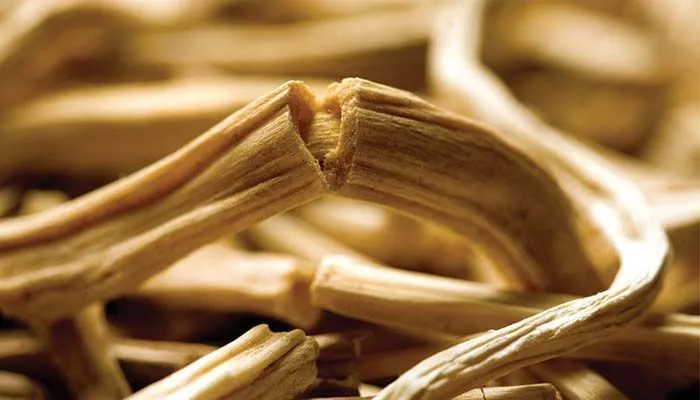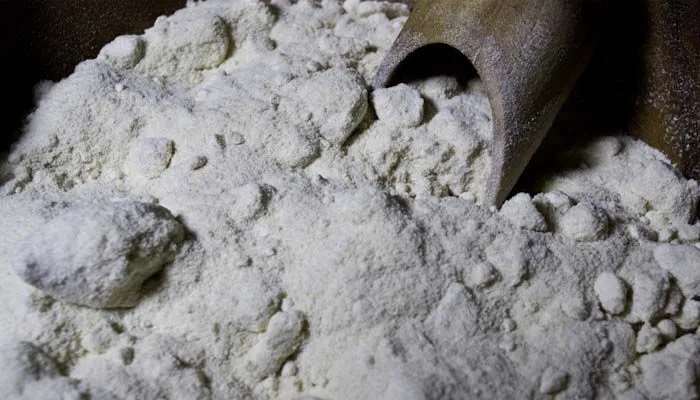The plant world provides us with a large number of antioxidant substances and protectors of the organism, some yet to be discovered. Not all of them have to have exotic origin or be collected in the deepest jungle. Every day we are surrounded by recognizable species with a potential to discover. Such a plant is called Shatavari, whose scientific name is Asparagus racemosus.
By the name it has, as you can guess, it has Indian origin, although it is a plant that belongs to the genus Asparagus, such as common asparagus. The presence of different antioxidant compounds has led this plant to be present in several scientific investigations to extract its full potential.
In this article we tell you all the benefits obtained with Shatavari’s scientific reputation, known as Asparagus racemosus.
Table of Contents
What is Shatavari (Asparagus racemosus)?
It is known by the Indian term Shatavari to a plant species of the asparagus family (Asparagus) whose scientific name is Asparagus racemosus. This plant is of the climbing type and can be found natively in much of India and the Himalayas. Its appearance is very similar to the false asparagus, with small and round fruits of red color.

For a long time, this plant has been used in the traditional Indian medicine (Ayurvedic medicine), although in recent years rigorous scientific research has been carried out to know the main effects and rule out those that do not present results.
How Shatavari is used
Currently Shatavari has not been sufficiently studied in scientific research, so the standardized dose for humans is not really known. Some studies carried out by the Journal of the American Herbalist Guild state that a dose of 5 ml of tincture extract is common to reduce some problems related to kidney stones.
This plant can also be consumed as an infusion, providing one tablespoon of Shatavari extract coffee per cup, up to a maximum of 2 cups daily.
Currently it can be purchased in soluble powder, in the form of solid tablets or even oil or liquid tincture. To know the exact dosage of each product format, you have to consult with the manufacturer specifications.
Medicinal properties of Shatavari
Let’s analyze the main studies available about the medicinal properties of Shatavari.
Strengthens the immune system
One of the uses that has traditionally been given to Shatavari is to strengthen the immune system. This has been analyzed in a clinical study conducted in 2004 in animals, to check the efficacy of the root extract and the number of antibodies it activated. The results were positive, seeing that in the animals to which Shatavari extract was provided, they improved the response of their antibodies to inoculated strains of pertussis.
Antioxidant activity
Many plants contain various substances characterized as polyphenols which have great potential as an antioxidant, reducing cellular oxidation by the presence of free radicals. These free radicals can come from harmful activities such as smoking, high-fat diet, burned foods and a long etcetera.
A family of substances with antioxidant activity present in Shatavari are saponins, which help reduce the effect of these free radicals.
One 2004 study found a very important component in this plant, known as racemofuran, with higher concentration in the root. At the same time, significant amounts of racemosol and asparagamin were also detected, other antioxidants very interesting for the body.
Antioxidants help prevent cell damage by free radicals. They also fight oxidative stress, which causes disease. Shatavari is rich in saponins. Saponins are compounds with antioxidant capabilities.
Balances blood sugar levels
Type 2 diabetes is one of the great challenges of humanidad in the XXI century, since the tendency to suffer a lack of control in blood glucose is increasing, as a result of the low physical activity carried out by the population and an unhealthy diet, high in fat and protein and low in fiber.
Various plants have demonstrated a relative effectiveness to help control it, as with the Shatavari plant. This has been demonstrated in a study conducted in 2007, where positive and significant results were observed in the regulation of blood sugar. One of the causes is that the extract of the plant stimulates insulin production.
Still, it’s such an important issue that more human studies are still needed to really know the efficacy of Asparagus racemosus.
Read more: medicinal herbs for diabetes control
Anti-inflammatory effects
The anti-inflammatory potential of Shatavari has been identified in the racemofurano. This substance acts analogously to the main anti-inflammatory drugs, which basically act as inhibitors of COX-2.
Although more studies are needed, this inhibitory action does not have as many side effects at the digestive level as other drugs, so an interesting range of new formulations from Shatavari extracts opens.
Effective against kidney stones
The effectiveness of this plant in reducing the harmful effect of kidney stones it has been investigated in several clinical trials, even establishing a dose of consumption of the extract to make the most of its effectiveness.
Most kidney stones are made up of substances known as oxalates. These crystals are very painful when they move through the body because they are formed by pointed and sharp corners.
One 2005 study performed on rats demonstrated the Shatavari efficacy to reduce the presence of these oxalate crystals, preventing their formation. A positive effect was also the increase in magnesium levels in the urine, with the potential to prevent the formation of crystals that are what generate kidney stones.
Read more: Is oxalic acid and oxalates really bad?
Reduces fluid retention
Excessive fluid retention causes tissue inflammation and can lead to more serious circulation problems. Often this problem is linked to suffering from a degree of heart failure that hinders proper blood circulation.
Currently, many diuretic medications Focused on eliminating excess water have important side effects, so interesting alternatives based on plant extracts are sought.
The first studies initiated in animals (rats), they have confirmed that the Shatavari plant is interesting for its diuretic activity at concentrations of 3,200 mg, not causing adverse side effects.
However, it is still necessary to take the next step and carry out scientific studies in humans, to see if the same results can be achieved as those obtained in animals.

Reduces cough symptoms
Currently there is a large catalog of plants used successfully for relieve cough symptoms. Shatavari root extract has historically been used in Ayurvedic medicine for this reason. Some scientific research have contrasted this use, obtaining positive results similar to some modern pharmacological products.
However, more studies are needed to determine how shatavari works to revive coughing.
Useful for the treatment of diarrhea
The Shatavari root extract It is commonly used as a home remedy to stop diarrhea. This is especially interesting in areas where the water quality is sometimes not very good, with the presence of different microorganisms that cause this problem.
One reliable source based on a study found a positive response in Asparagus racemosus to reduce diarrhea. However, more studies are needed to test whether this effectiveness is similar when the trial focuses on humans.
Read more: prevent diarrhea with Lactobacillus rhamnosus
Improves ulcer treatments
Untreated digestive problems can end in formation of stomach ulcers, considered very painful and dangerous. This problem can come from an abusive consumption of drugs with side effects to treat ailments.
Shatavari has shown in various investigations have a benefit against the formation of ulcers almost the same as current modern medicines. However, it focuses on gastric ulcers that have no origin due to stress, since it does not have the same effect depending on the nature of origin.
Delays aging
The habitual consumption of antioxidant substances has been shown to produce a delay in the premature cellular aging and telomere shortening. Saponins play an essential role in this delay, considering that Shatavari contains a high concentration of these substances. This happens since the amount of oxidative free radicals that circulate in our body is reduced.
Currently we can see different cosmetic and personal hygiene products used based on Shatavari Extract. However, more research is still needed to know the role of protection of the epidermis against aging.
Potential against depression
Some substances from plants play an important role in preventing the initial symptoms of depression. This disease, which is advancing unstoppably in modern society, needs more weapons to prevent its lack of control.
One 2009 study on animals demonstrated efficacy by increasing antidepressant capacity of the organism, acting in parallel to the current medicines. Its effect is related to the improvement of the neurotransmitter activity, related in turn to the symptoms of depression.
However, the success of these studies has only been demonstrated in animals, so you have to take the next step and conduct the study in humans.
Shatavari-based products
Is there a risk of side effects?
Currently there is not much research that has revealed its properties on humans. Therefore, the negative effects it may have are also unknown. Ayurvedic medicine has used Shatavari extract for a long time and no major side effect issues have been highlighted.
A priori, in the absence of further research and lack of data, it is not recommended to the pregnant women or breastfeeding its use, at least until further studies are conducted. There have been some reports of allergic reactions in some people taking shatavari, especially if they were already allergic to the components of asparagus.
Therefore if you are allergic to asparagus, you should avoid using extracts of this plant.
References consulted
-
Immunoadjuvant potential of Asparagus racemosus aqueous extract in experimental system. Journal of Ethnopharmacology. Volume 91, Issues 2–3, April 2004, Pages 251–255.
- Identification of antioxidant compound from Asparagus racemosus. Wiboonpun N1, Phuwapraisirisan P, Tip-pyang S.
-
Insulin secretory actions of extracts of Asparagus racemosus root in perfused pancreas, isolated islets and clonal pancreatic -cells. Journal of Endocrinology.
- Antilithiatic effect of Asparagus racemosus Willd on ethylene glycol-induced lithiasis in male albino Wistar rats. Methods Find Exp Clin Pharmacol. 2005.
- Acute toxicity and diuretic studies of the roots of Asparagus racemosus Willd in rats. West Indian Med J. 2010 Jan;59(1):3-6.
-
Antitussive effect of Asparagus racemosus root against sulfur dioxide-induced cough in mice. Phytotherapy.
- Anti-diarrhoeal potential of Asparagus racemosus wild root extracts in laboratory animals. J Pharm Pharm Sci. 2005 Feb 25;8( 1):39-46.
- Antiulcer and antioxidant activity of Asparagus racemosus Willd and Withania somnifera Dunal in rats. Ann N Y Acad Sci. 2005 Nov;1056:261-78.
-
Antidepressant activity of Asparagus racemosus in rodent models. Pharmacology Biochemistry and Behavior Volume 91, Issue 3, January 2009, Pages 283-290.
